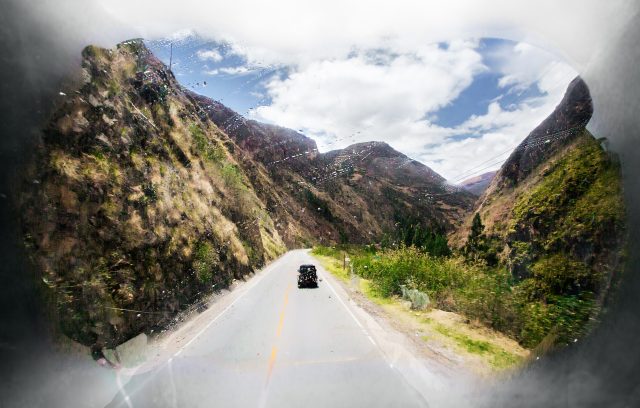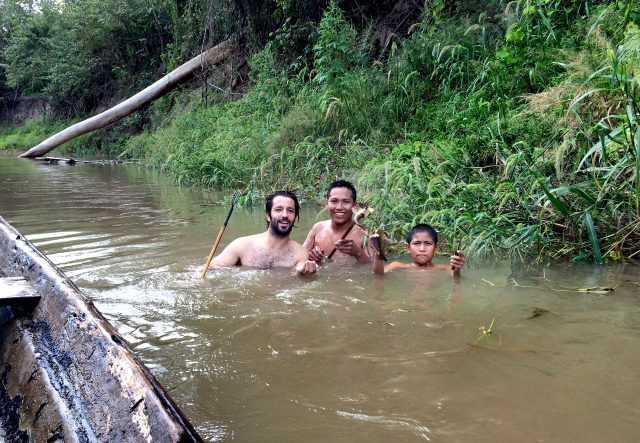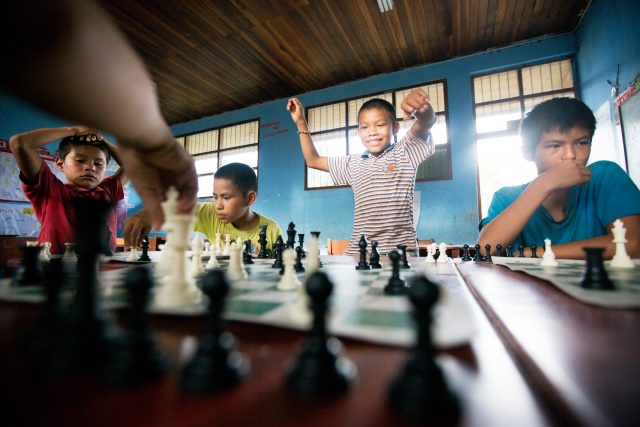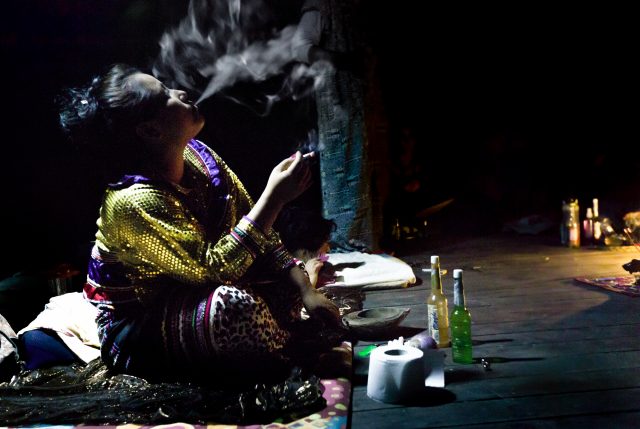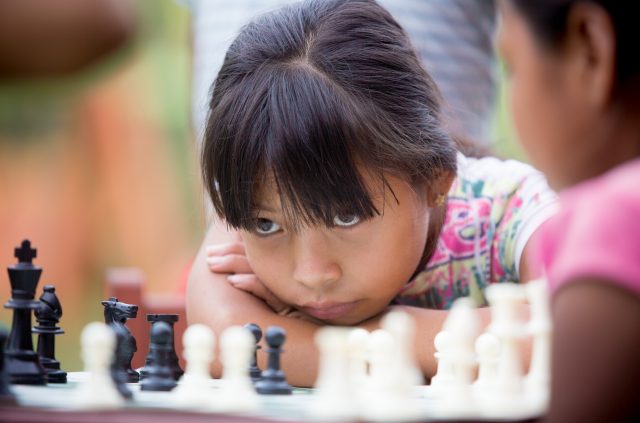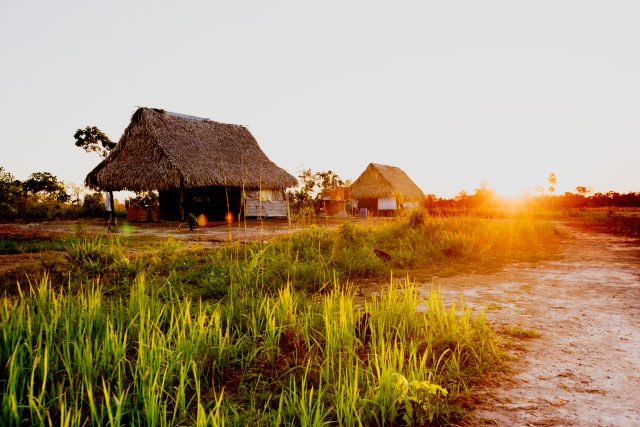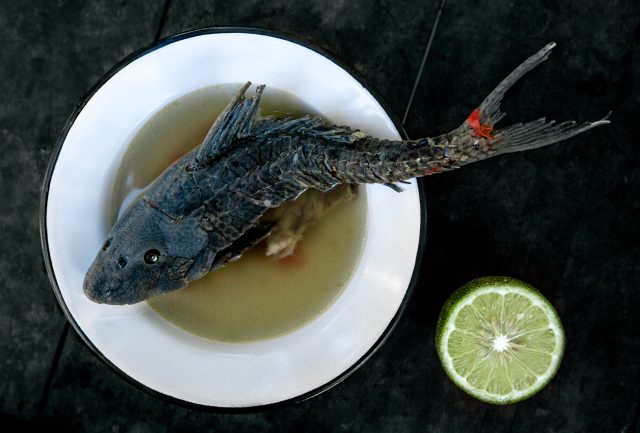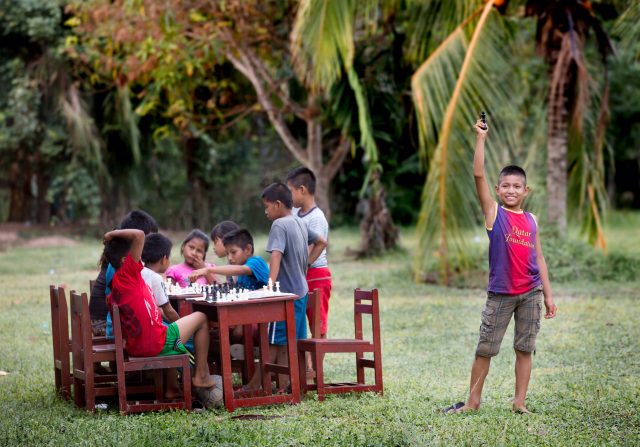“It’s ok. The anacondas are sleeping,” says Elmer.
“And the piranha?” I ask.
“Pequeños,” he replies. We were neck-deep in an Amazon tributary and Elmer, my jungle brother, was teaching me how to fish with my bare hands. I was freaking out.
Elmer would thrust his arm underwater into deep black holes in the river bank and every dozen holes wrestle a fish out of its nest. They were ugly and sharp with a gray armor that dripped in the sun when he trophied them above his head.
It was my turn. Was I nervous? Incredibly. The mystery of each hole spun my imagination around the Amazon’s most notorious fangled demons. However facing nature and fear together is one of my goals in every remote travel experience as long as it calls me and at that moment it was yelling.
“This is it,” I thought, “THIS is what I came for.”
My fingers traced the mud until I found a cavity underwater. I crept my hand deep inside, slowly, until my neck pressed against the muck and my shoulder corked the hole. I jerked to something sharp on my fingertips—but to my surprise the fish didn’t move. It was still, trapped against the end of its nest. I clasped and then felt its power as its tail flipped furiously. My adrenaline spiked and I tightened my grip around its scales. I was yanking forcefully but its fins had ejected into the nest walls creating a powerful resistance. An even tighter grip using my feet for leverage, cold mud sliming between my toes and pulling harder until, finally, I jousted my competitor into the air and let out a primal scream.
Three months prior close to midnight I took a date to Chess Forum, the last chess shop in New York City. Imad, the owner, set us up with a chess table on the sidewalk and some plastic cups for our wine. We were delighted playing chess as the car lights streamed by. The winner, Imad told us, would be gifted a scorpion queen chess piece (though his intention was always to gift it to the lady—such a romantic). He chatted with us for hours afterwards about travel and chess. He was extremely gracious and determined to keep his chess shop alive amidst the game’s dwindling popularity since the 1980s.
A couple weeks later I decided to leave NYC after my first year as a freelance photographer. Though my passion project in photography was working I had promised myself to leave NYC after a year in case I had lost touch with nature and spirituality as I had experienced in Bhutan a year prior. A friend I had met while living in Bhutan connected me via Facebook to Juan Agustin, an Amazonian tribe leader. Juan was very welcoming and excited to find me a host family in the jungle. He asked if I would provide an English class for the children. I agreed and proposed chess as well considering my father was a chess teacher (and maybe because I wanted to impress a girl). Juan was elated. Imad immediately came to my mind. He jumped at my proposal to partner and donated three roll-up chess boards checkered green and white with bags of plastic chessmen.
After a flight to Lima and a 28-hour bus across the Andes, I arrived in Pucallpa, a port city on the Ucalayi River. My destination was San Francisco Village, the largest settlement of the Shipibo-Conibo tribe (pop: 3,500), reachable by 1-hour off-road mud taxi unless it rains which is half the year and then you take a canoe.
I arrived at night and was greeted by a family of 16 dressed in mismatched cottons. Enrique, the grandfather and head shaman, escorted me to a wooden hut. With the flick of a switch a single candescent light bulb vignetted the room. He hung a hammock and with his permanent smile repeated the word “tranquilo” as his grandsons rummaged through my stuff. “Ajedrez!” I said. They were eager to learn.
Fifteen kids half my height ran into the classroom, then ran out, then back in. Many were screaming, girls were laughing, one had his hand in my backpack, another was standing on his desk. I tried to remember my “cool” teachers and how they controlled a classroom (the answer is always candy FYI). I rolled out the chess boards onto the desks and they hovered around.
“Rey. Reyna. Obispo…” The words gleamed from my iPhone as I showcased each piece. “Los Peones,” and I set up the “pawn game.”
I was amazed at how quickly their pawns advanced and swapped. Many mistakes were made and I corrected diligently noticing that after each failure their mistakes lessened. Soon they were correcting each other in Spanish and their tribal tongue. “Vincente! El ganador!” they yelled when their pawns reached the other side. I extended class an extra hour and was swarmed with hugs.
In my following classes I set up the school desks outside during sunset under a coconut tree. We immediately advanced to full games due to a mutual impatience. But my restaurant Spanish reached its limits. Taking a piece became “eating it” and the winner was the one who could “Eat the king!” They would point to their opponents bishop for example and say, “Quiero comer?” (Can I eat this?)” and I would say, “Yes! Eat!” “Eat the king!” I prescribed.
After classes I would find Magda, the matriarchal mother and shaman, squatting next to a campfire with boiling pots of ipo (scientific name: Pseudorineleps Genibarbis). Ipo is the Shipibo’s favorite fish, the same prehistoric catfish that I would hurl above my head that day in the river. It is traditionally served whole in a bowl of onion-tomato broth with a wedge of lime, and salt. Dinners in the dark were a cacophony of sucking and slurping as the families vacuumed the lungs, brains, and kidneys in to their stomachs. At first, my fingers performed an embarrassing puppet show with the fish, but I learned quickly. I came to crave ipo's sweet tender meat—like crab—and rich organ buffet—like puzzle-pieced cartilage between my teeth. I learned what parts to eat—everything but the heart—and if I got a bone lodged in my throat I could smooth it down with a gooey plantain.
Formally in chess, you cannot legally lose your king. He never gets “eaten.” Instead, the winner is the one who traps the king and forces submission. The children failed to foresee their king’s demise because they were still learning piece movement, and worse they did not understand how to value their king. Rather than focus on this negative development, I adjusted and simply allowed their supreme royal to be swallowed, thereby ending the game without checkmate. The result was kids gleefully swiping the king in hand, pushing it in my face and yelling, “Vicente! El ganandor!”
With each prized king the pace of games slowed. Eventually creative strategies formed and defending the kingdom became as balanced as the attack. I smiled most when they were pensive. An arm propped up a chin while several sets of eyes traced the board from over shoulders. “This is chess,” I thought.
A month in, I became awed and threatened by natural and mystic secrets of the jungle. Enrique taught me the plant properties on his medicine farm, ranging from love potions to pain relievers and dream enhancers (Love potions? Yes, it worked. But that’s another story). The knowledge of which was passed through generations of shamans. I would learn to cook ginger-based stomach remedies and suck on sugar cane in the absence of fresh water. There were good wizards, “shaman,” bad wizards, “brujos,”and organ hunters that flashed blinding lights to abduct natives “pishtacos” (someone could do an entire documentary on these psychos). Tarantulas and “Draculas” lived in the roof of my hut—No, that was my village brother jesting in translation—they were bats. The tribe casted upon me a dozen protection spells and I wore defensive armlets. The most noticeable of curses was my morning ritual to the ceremonial toilet (ugh).
Other nights, the family held ayahuasca ceremonies, the tribe’s most sacred ritual. They would become neon garments, head-to-toe, armed with sequins reflecting the candlelight like a thousand tiny mirrors. They drank ayahuasca, a psychoactive murky plant brew, and chanted “icaros,” a deep native hymn. My tribe sister said I morphed into an anaconda and the same for my friend but with a tigress head. These visions are common to a properly conducted ceremony. To close ceremonies, Enrique would make inhaling whooshing sounds on foreheads and then spit something into a bucket. He believed these to be exorcisms, and in the moment, I was not about to argue. Even the ipo’s famous zigzag scales cascaded through ancient tribe member’s visions, which then provided inspiration for artwork. We slept on the floor of a ceremonial hut over-night and the boys casually left for school in the morning.
Did I take Ayahuasca? I ingested a marmalade version during one ceremony because the vibes felt right but apparently not enough for visions. Coincidentally my month long intestinal issues vanished the next morning. The shamans only encouraged it if the “Mother Ayahuasca” called to me and other than that night it did not so instead I observed ceremonies like a good photographer. To be honest, part of me was worried my brain would fall into schizophrenia but over time I witnessed side effects in some foreign patients that I did not like. It seemed a few foreigners had been enlightened by ayahuasca and others, though happy, had lost their groundedness. Had they done too much? Had they received a bad batch from a bad witch? Had they already done too many drugs back in the states? I could see their minds forever mixing the paints of reality and illusion into a murkiness of thought, and for that I became cautious. Yet all the Shipibo were so grounded it was as if they weighed twice their mass and their feet had been planted into the mud ready to dry as concrete. Ayahuasca was in their blood. Passed through generations and ingested from an early age. I think some foreigners are capable of visiting their spiritual realm but not all are suited. This shortcut to enlightenment can be very enticing and for that reason many imposter shaman lure in tourists with promises of a true ayahuasca experience for a couple hundred bucks. I’ve even heard of a pill form in Miami (haha, what??). My advice is: if you’re going to swallow the yellow pill make sure it calls you first and that you’re getting it from the right Morpheus (“I know KungFu.”)
After 12 weeks, I am sitting across from Enrique who is sweating and shirtless after a day farming and prepping for the ayahuasca tourist scene. He was casually whipping his back with his t-shirt, as he always did, waving off battalions of mosquitoes.
“Bastante pescado!” (More than enough fish!) he says laughing.
His arms reach wider than any fish I had seen and he points to the river, “Aca! (Right here).” His eyes widened.
Elmer and I had taken a 2-hour canoe to catch a decent bounty and Enrique is telling me that in his day the bounty and the fish were much larger. The Shipibo’s primary food supply is dwindling, tribe leaders tell me, due to outsiders overfishing their rivers. I wonder how many other modern world issues are affecting their ecosystem; because it is obvious the fish and even the mango tress are a quarter of the size than some other remote areas of the Amazon I visited during my stay. Hunt-and-gather is becoming work-and-buy and the culture is changing. Money or “plata” is the newest game in survival.
Boys of the tribe now enlist to work in distant gold mines, tribeswomen wander city blocks peddling arts (the same ones I might ignore with a fake smile on the street), and shamans travel overseas and across continents for the right price. Coming home together for a bowl of ipo is increasingly difficult and the money, they tell me, is not enough. Despite their smiling disposition, they are struggling. Better jobs from better education have become a primary goal in the battle against poverty and in defending their culture. I was hopeful my chess classes could play even a small part.
As I start my 12th and final class, we still have not had one genuine checkmate. I am feeling a little down.
“How ridiculous to teach chess without checkmate?” I think. “Maybe eating the king was a horrible idea.”
Even Aaron who would come to my hut at night to play could not trap my king without my help. However, I knew he could beat the other children, so I ask him why he likes chess. “Because it is good for the mind, it is good mathematics, and it is good for wisdom,” Aaron replies.
This thoughtful answer echoes the tribe leaders who encourage the game for its academic benefits. Aaron’s favorite piece is the queen, the game’s most powerful player.
A few days later it is time for the final tournament but it rains. When it rains here mother earth opens wide and everything else must wait, including my chess tournament. At dusk, the day finally clears and I set up the desks under the tree.
A king rises to the sun. Then another king. Aaron advances as expected and faces his brother Matias in the finals.
Aaron’s first move is knight to F3—I never taught him that. They are methodical, and patient, until Aaron swarms with two pawns and a queen. A series of checks are fired. Matias darts his king and then darts again. Aaron’s knight joins the fight and presses Matias against a wall.
Matias stops. He does not move. I am waiting for a move, followed by Aaron’s ceremonial swipe of the king, but it does not come. Matias is trapped, and for the first time, he recognizes it. He seems perplexed. They both do. I however, am thrilled.
“This is checkmate!” I yell, “This is checkmate!”
Aaron repeats in his accent, “Checkmate!” and for the first time the kings remain standing.
Now Hiring Volunteer Chess Teachers: A foundation for tribes in the Amazon wants to expand the chess program to other villages where scholastic programs are already in place. Imad and his Chess Forum are on board. If you would like to connect with nature through chess shoot me an email. We have no intention of reaching uncontacted tribes and will avoid it purposefully.
If interested in the 2-3 month program please email Click here to show email address. You will be responsible for flights and transportation. Hut and fish provided.
Thank you to the Shipibo-Conibo tribe, the Flores family, and others who helped in this journey.
Categories
Archives
- January 2026 (13)
- December 2025 (27)
- November 2025 (29)
- October 2025 (39)
- September 2025 (27)
- August 2025 (29)
- July 2025 (43)
- June 2025 (25)
- May 2025 (24)
- April 2025 (29)
- March 2025 (29)
- February 2025 (20)
- January 2025 (24)
- December 2024 (34)
- November 2024 (18)
- October 2024 (35)
- September 2024 (23)
- August 2024 (27)
- July 2024 (44)
- June 2024 (27)
- May 2024 (31)
- April 2024 (51)
- March 2024 (34)
- February 2024 (25)
- January 2024 (26)
- December 2023 (29)
- November 2023 (26)
- October 2023 (37)
- September 2023 (27)
- August 2023 (37)
- July 2023 (47)
- June 2023 (33)
- May 2023 (37)
- April 2023 (45)
- March 2023 (37)
- February 2023 (28)
- January 2023 (31)
- December 2022 (23)
- November 2022 (32)
- October 2022 (31)
- September 2022 (19)
- August 2022 (39)
- July 2022 (32)
- June 2022 (35)
- May 2022 (21)
- April 2022 (31)
- March 2022 (33)
- February 2022 (21)
- January 2022 (27)
- December 2021 (36)
- November 2021 (34)
- October 2021 (25)
- September 2021 (25)
- August 2021 (41)
- July 2021 (36)
- June 2021 (29)
- May 2021 (29)
- April 2021 (31)
- March 2021 (33)
- February 2021 (28)
- January 2021 (29)
- December 2020 (38)
- November 2020 (40)
- October 2020 (41)
- September 2020 (35)
- August 2020 (38)
- July 2020 (36)
- June 2020 (46)
- May 2020 (42)
- April 2020 (37)
- March 2020 (60)
- February 2020 (38)
- January 2020 (45)
- December 2019 (34)
- November 2019 (35)
- October 2019 (42)
- September 2019 (45)
- August 2019 (56)
- July 2019 (44)
- June 2019 (35)
- May 2019 (40)
- April 2019 (48)
- March 2019 (61)
- February 2019 (39)
- January 2019 (30)
- December 2018 (29)
- November 2018 (51)
- October 2018 (45)
- September 2018 (29)
- August 2018 (49)
- July 2018 (35)
- June 2018 (31)
- May 2018 (39)
- April 2018 (31)
- March 2018 (26)
- February 2018 (33)
- January 2018 (30)
- December 2017 (26)
- November 2017 (24)
- October 2017 (30)
- September 2017 (30)
- August 2017 (31)
- July 2017 (28)
- June 2017 (32)
- May 2017 (26)
- April 2017 (37)
- March 2017 (28)
- February 2017 (30)
- January 2017 (27)
- December 2016 (29)
- November 2016 (24)
- October 2016 (32)
- September 2016 (31)
- August 2016 (27)
- July 2016 (24)
- June 2016 (26)
- May 2016 (19)
- April 2016 (30)
- March 2016 (36)
- February 2016 (28)
- January 2016 (32)
- December 2015 (26)
- November 2015 (23)
- October 2015 (16)
- September 2015 (28)
- August 2015 (28)
- July 2015 (6)
- June 2015 (1)
- May 2015 (2)
- April 2015 (1)
- February 2015 (3)
- January 2015 (1)
- December 2014 (1)
- July 2010 (1)
- October 1991 (1)
- August 1989 (1)
- January 1988 (1)
- December 1983 (1)


